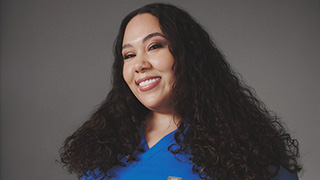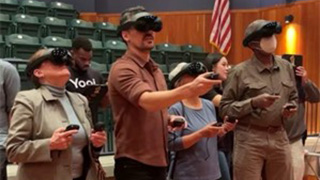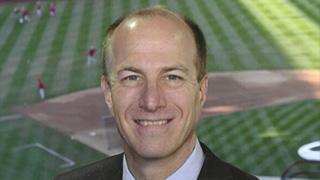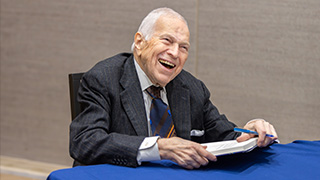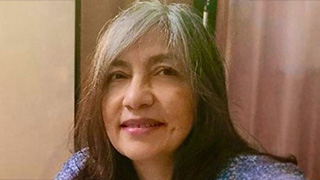Athletic Training Students Gain Valuable Experience at Clinical Rotations
Wednesday, February 19, 2020
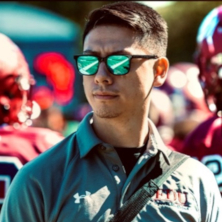
- Professional sports teams
- Sports medicine and rehabilitation clinics
- Public and private secondary schools
- Colleges and universities
- Sports performance and training facilities
- General medicine clinics
Of her experience at Union High School, second year graduate student, Julia Stirpe, says that she enjoyed being at a high school where there was a great number of student athletes. She learned that there are a lot of moving parts that go into providing great health care, and her preceptors did an amazing job at teaching her how to handle it.
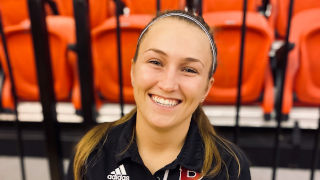
Jessica Collum, second-year MSAT student.
Jessica Collum, another second year AT student, was placed at Rutgers University-Newark Campus during the Fall 2019 semester. "Rutgers helped me learn a lot about the AT profession, such as the different approaches to certain rehabilitation plans for ACL repair surgeries and how important it is to take the patient's perspective into consideration when building a treatment plan," says Collum.
One student placed at Rutgers University-New Brunswick Campus, was Gabriel Scher, a second year student who worked with the Rutgers University football team. According to Gabriel, "Working with a football team demands a higher intensity and sense of urgency. I learned how to think quickly on my feet, make critical clinical decisions, and how to communicate with different personnel including other AT students, Sports Medicine staff, coaches, physicians, equipment and associated support staff."
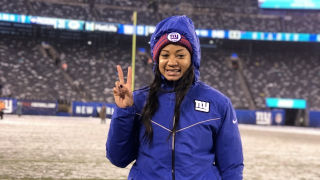
Kaprice James, second-year MSAT student.
MSAT student Kaprice James, had the opportunity to work with the NFL's New York Giants and with New Jersey Institute of Technology's Athletic Training Staff. These rotations allowed her to understand what is needed of the interns; including long hours, a fast- paced work ethic, the ability to multitask, and the adaptability of quick thinking. Her advice to future MSAT students is that "You will make your clinical experience, what you make it, and you will get out what you put in. Try new things, be willing to be uncomfortable so that you can learn and be open to asking for help. Clinical plays a major role in your education and allows you to learn new tools that you may not see in the classroom. Seton Hall has great clinical affiliations and I am happy I had the opportunity to experience some of them."
Student Jesse Leon, who was placed at Fairleigh Dickinson University-Florham Campus, was able to practice various skills taught to him by teachers in the clinical setting and on the field. "I was able to apply my skills at collegiate football games and at NCAA playoff games for field hockey. It gave me an idea of what it means to dedicate your time to take someone who is injured all the way to fully participating," says Leon.
When paired with exemplary classroom instruction, high-fidelity simulation and Standardized Patient (SP) activities at the Interprofessional Health Sciences (IHS) Campus in Nutley, these real-world clinical experiences are invaluable to students. Dawn Maffucci, MA, ATC, states that, "as the Director of Clinical Education for the MSAT program, I work hard to make sure that students are placed in a facility that optimizes their learning. We want every student to utilize this experience to the best of their abilities and come out feeling better prepared for the future."
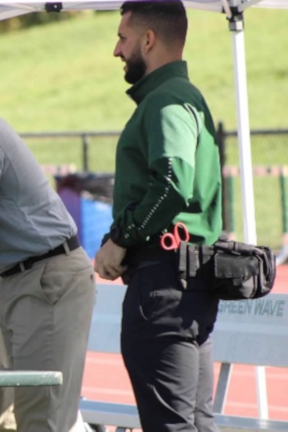
Eric Hernandez, first-year MSAT student.
When asked if he has an advice for future MSAT students, Eric Hernandez, who was at Delbarton School, a private high school in Morristown, NJ, says that, "This program is challenging, but it will make you a better clinician. Just like an athletic trainer, you are part of a team. Use your classmates as resources, study together, learn from each other, and share your experiences. This will make your first year much easier."
For further information, visit:
- Dual degree (undergraduate-to-graduate) program
- www.shu.edu/setonhallAT - video, brochure, alumni profiles and other resources about the Seton Hall University MSAT program
Categories: Education, Health and Medicine

